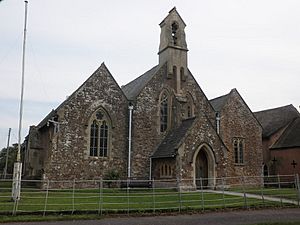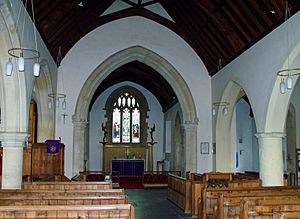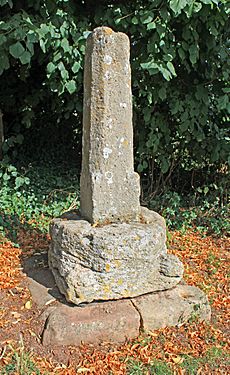Church of St Peter, Williton facts for kids
Quick facts for kids Church of St Peter |
|
|---|---|
 |
|
| Location | Williton, Somerset, England |
|
Listed Building – Grade II*
|
|
| Designated | 22 May 1969 |
| Reference no. | 1174922 |
| Lua error in Module:Location_map at line 420: attempt to index field 'wikibase' (a nil value). | |
The Anglican Church of St Peter in Williton, Somerset, England, is a very old and important church. It is officially listed as a Grade II* building. This means it is a special historic place that needs to be protected.
The first church on this spot might have been a private chapel. It belonged to a Saxon royal family. In the 1100s, Reginald Fitzurse was the local lord. He was one of the knights who murdered Thomas Becket. After this, the church was given to his brother and the Knights Templar. The church was largely rebuilt in the 1500s. It was rebuilt again in the 1850s. This was part of a big "Victorian restoration."
For many years, St Peter's was a "chapel of ease." This means it was a smaller church that helped the main church in Church of St Decuman, Watchet. In 1889, St Peter's became its own separate parish. Today, it is part of the group of churches in Watchet and Williton.
Contents
Church History
The exact start date of St Peter's Church is not known. It might have begun as a private chapel. This chapel would have been for a Saxon royal family. The church's importance changed a lot in 1170. This was when the local lord, Sir Reginald Fitzurse, became one of the murderers of St Thomas a Becket.
After the Murder
After the murder, part of the land went to Reginald's brother, Robert. The other part went to the Knights Templar. A historian named John Collinson wrote that Robert rebuilt the chapel. This suggests the old Saxon chapel was in ruins.
Becoming a Daughter Church
Old documents from Wells Cathedral show Robert gave property to the Church of St Decuman, Watchet. He also gave certain rights in the chapel. This made St Peter's a "daughter church" of Watchet. It became known as a chapel of ease.
The Current Building
Some parts of the church you see today are from the 1500s. More work was done in the 1600s. At that time, the church was called All Saints. In 1810, a new section was added to the south. The old windows from the Elizabethan era were moved and reused there.
Victorian Restoration
The church became quite run down. So, from 1856 to 1859, it had a big "Victorian restoration." This means it was repaired and updated. The architect for this work was Charles Edmund Giles. The priest in charge was Samuel Heathcote. He worked at the church from 1854 to 1906. He was first a "Perpetual curate." But from 1889, he signed as "Vicar." This showed that Williton had become its own parish.
Church Spire and Bells
The church used to have a small spire. But it was damaged in a storm. After that, the bells were kept in a wooden bellcote. A new stone bellcote was built in 1896.
Building Materials
The church is built from red sandstone. It has special decorations made of Bath stone. It now has a main area called a nave. This nave has four sections. There are also side areas called north and south aisles. The front part, called the chancel, has a rounded ceiling.
Inside the Church
The inside of the church has a wooden board. It lists the names of 23 people from the area. They died in World War I. It also lists 13 people who died in World War II.
There is a special stone basin called a piscina. It is from the 1400s. The font, used for baptisms, is made of alabaster. It dates from 1666. The "poor box," where people could donate money, is from 1680.
Churchyard Features
In the churchyard, there is a red sandstone base of a cross. It is from the late 1200s. This cross base is also a Grade II* listed building. It is also an ancient monument.
See also
- List of ecclesiastical parishes in the Diocese of Bath and Wells
 | Percy Lavon Julian |
 | Katherine Johnson |
 | George Washington Carver |
 | Annie Easley |



